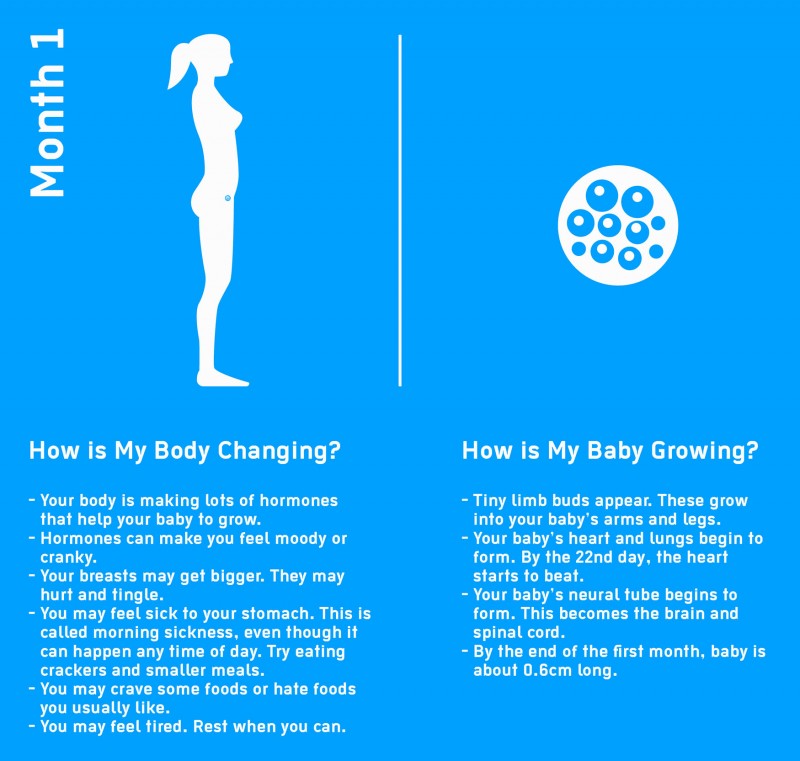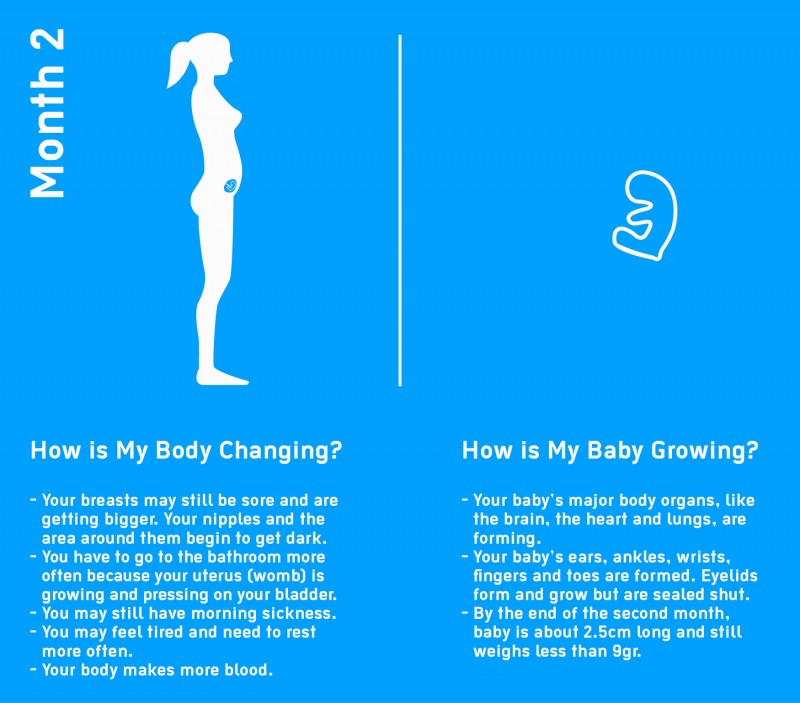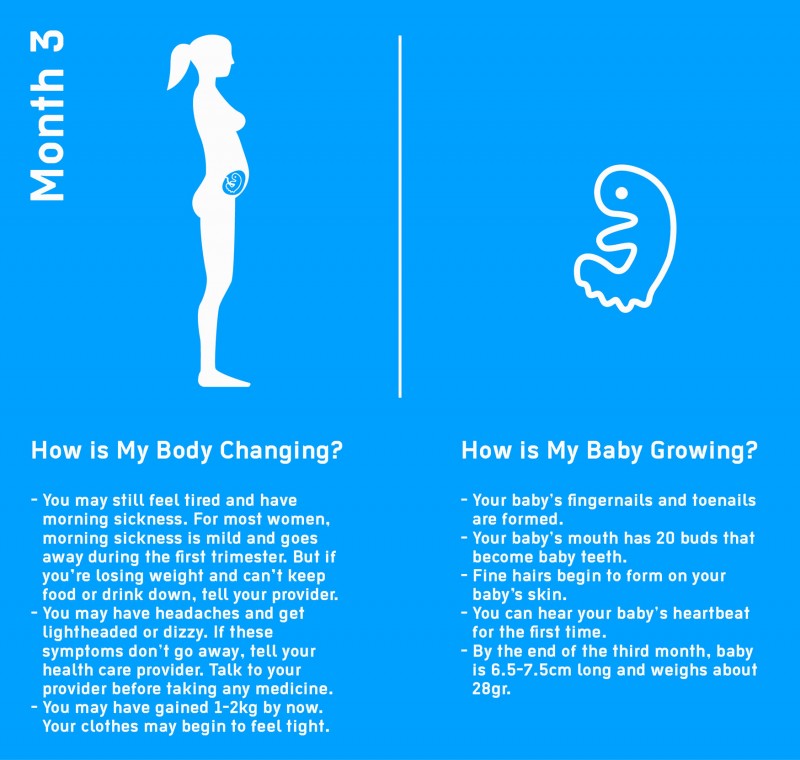First weeks of pregnancy
A typical pregnancy lasts for 40 weeks. This is counting from the first day of your last menstrual period even though you were not pregnant then. The first day of your last menstruation is typically about two weeks before you ovulated and conceived your baby. It is counted this way because most women do not know exactly when they ovulated, but most know when their last period started. Pregnancy is separated into three trimesters:
- Trimester 1 covers weeks 1-13
- Trimester 2 covers weeks 14-27
- Trimester 3 covers weeks 28-40
Only about 5% of babies are born on their due date; mostly they come a little before or after. Calculate your baby’s due date here.
How is my body changing and my baby growing?
Why do I feel so sick?
About 75% of women experience some type of morning sickness, which can come at any time of the day, and even sometimes all day. The nausea usually starts around 6 weeks of pregnancy, but it can begin as early as 4 weeks. It tends to get worse over the next month or so. Most women get relief from the nausea by 14-20 weeks of pregnancy, but sometimes it will return later and come and go throughout pregnancy. Try these ideas to help ease your morning sickness:
- Eat small, frequent meals and snacks throughout the day. Keep simple snacks, such as crackers, with you.
- Avoid lying down after eating.
- Try to avoid foods and smells that trigger your nausea and avoid fatty, acidic or spicy foods.
- Drink fluids mostly between meals. Aim to drink two liters of water each day. If you have been vomiting a lot, drink electrolytes (you can make your own with 1 liter water, 1/2 teaspoon salt and 6 teaspoons sugar).
- Get fresh air; take a walk or open the window.
- Take your prenatal vitamins with food or just before bed.
- Try ginger to settle the stomach (grate fresh ginger into hot water to make a tea).
- Take extra Vitamin B6 by eating plenty of bananas, nuts, green beans, carrots, cauliflower, potatoes, lean meats, and fish. You can also take a supplement.
- Check with your doctor if you can take any over-the-counter or prescription medications as many are not safe during pregnancy.
For ideas on how to relieve other pregnancy discomforts, click here.
Prenatal tests
The sooner you go to the doctor the better as this will help determine how many weeks pregnant you are and you can start taking better care of yourself and your growing baby. Following are some ideas of what to ask at your first prenatal appointment:
- How much weight should I gain, given how much I weigh now?
- Do I need to exercise and if so, what type of exercises and how much?
- Are there any restrictions on sex during my pregnancy?
- Do I have an increased risk of any complications or conditions? What additional tests might I need?
- What should I eat and drink and what should I avoid?
- Are the medications I am currently taking safe? If not, what can I take or do instead? What other over-the-counter medications are safe?
- What beauty treatments are acceptable during pregnancy e.g. hair dye, manicure?
- What symptoms should I expect, and how can I manage them? What is normal, and what should I call you about?
- What should I do if I… Don’t feel well? Cramp? Spot? Have a fever? When should I call you or go to the hospital?
- I've already had C-section delivery. Could I have a vaginal birth this time?
The following is what you can expect from a prenatal visit in the first trimester:
| 6-13 weeks: |
- Health check with questions on last menstrual period, number of pregnancies, allergies, previous problems including miscarriage and chronic diseases, family’s medical history including genetic diseases, habits which will impact fetus e.g. smoking, drinking, drugs. Doctor will measure your weight and blood pressure.
- Counseling by the doctor on how to take care of your health, foods to eat or avoid, prenatal vitamins, likely discomforts, any warning signs to watch for, further tests to consider, and the normal changes to expect before your next visit.
- Pelvic exam to check structure and take a swab to look for abnormal cells.
- Lab tests to check blood (blood type, complete blood count, STDs, fetal genetic diseases^), and urine (protein and bacteria levels).
- Ultrasound to check fetal development (gestation and due date, size, heartbeat, blood pressure, structural anomalies), multiple pregnancy determination, and screening for genetic diseases^.
|
*The amount you see your doctor will depend on your medical history and if there are any complications that require more checkups. The WHO recommends a minimum of four prenatal visits around weeks 16, 24-28, 32, 36 for uncomplicated pregnancies. However in many countries, women go every month to the doctor, and every week during their last month of pregnancy.
^Together, the blood test and the ultrasound are known as the first-trimester combined screening, which provides a risk assessment of the fetus having Down syndrome as well as other chromosomal problems and birth defects. These tests are optional; you can agree or refuse to have them. These tests are not definitive, but provide a relative likelihood of the fetus having a genetic defect. There are two diagnostic tests that provide a certain result: 1) Chorionic villus sampling (CVS), done at 11-12 weeks; or 2) Amniocentesis, done at 16-20 weeks. These tests are invasive and carry a small risk of miscarriage, so they are typically only performed when the woman shows a higher risk for genetic and chromosomal problems. Your doctor will advise you if an invasive test is necessary, but again this test is optional and it is entirely your decision to have one or not.
Let's talk about sex
- Most women can continue to have sex up until they go into labor. Sexual activity will not hurt the baby. The baby is kept safe by the amniotic sac, cervix, and uterine muscle. There is also a thick mucous plug that seals the cervix and protects the baby from infection.
- It is normal for sexual desire in women to decrease in the first trimester due to breast tenderness, fatigue nausea. Other women find the freedom of not having to worry about birth control or conceiving makes sex more enjoyable. By the second trimester, many women feel less nausea and experience heightened sexual desire.
- Fathers can support and/or raise their partner’s self-esteem about their changing body by offering positive comments.
- As the body changes during pregnancy, couples may need to try different sexual positions to find what is comfortable for her. Some women discover new or increased sexual pleasures during pregnancy because of such experimentation. “Spooning” while sitting up offers plenty of room for manual stimulation, side-lying allows for comfortable oral stimulation, and experimenting with pillows and support devices can help enhance and support a variety of positions and activities.
- Due to a sense of fullness, some women find vaginal penetration uncomfortable at some points during pregnancy and opt for manual, oral, or self- pleasuring sex instead
- Some cramping after making love is normal throughout pregnancy. The uterus contracts during orgasm and these contractions might be more noticeable during pregnancy as the uterus gets bigger.
- If the partner is at risk of experiencing pregnancy complications (vaginal bleeding, leakage of amniotic fluid, etc) the health provider will advise you to stop having sex. Be open with your health provider and ask what sexual activity can be done instead.
Excerpted from Chapter 6: Relationships, Sex, and Emotional Support in Our Bodies, Ourselves: Pregnancy and Birth © 2008 Boston Women's Health Book Collective
Encourage your husband’s involvement
Studies that looked at the impact of father’s presence during childhood found that those children who had an involved father early on have, on average, fewer behavior problems, less criminal activity, better economic stability, better cognitive development, better performance in school and less stress during adulthood. Encourage your husband to get educated and involved by showing him the For Fathers section of this website and coming along to a free Fathers session at our Mother's Class Center. These classes are taught by men, for men. Knowing what to expect and getting his questions answered will reduce his stress and give him ideas for rewarding ways to be involved.
Category: First trimester


